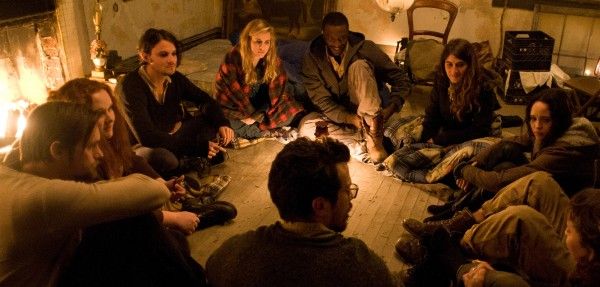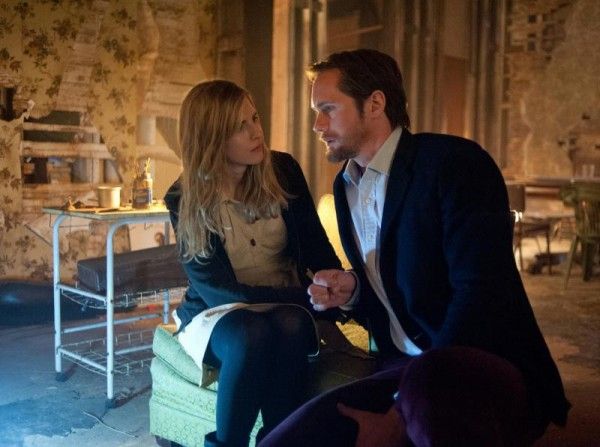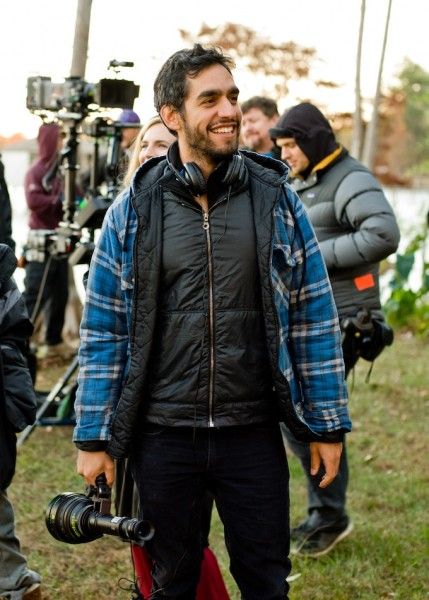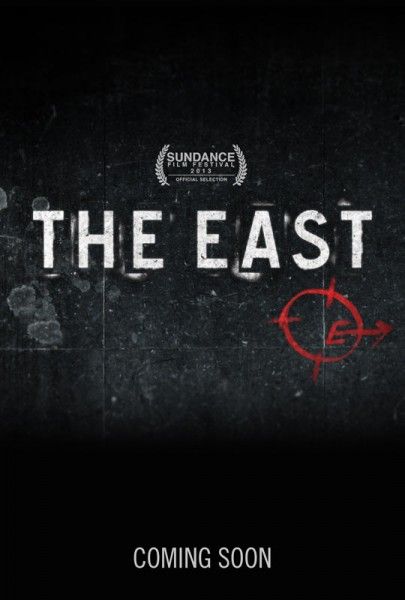The 2013 Sundance Film Festival saw the debut of a number of filmmakers, but one of the most anticipated titles was the follow-up film from Sound of My Voice director/co-writer Zal Batmanglij and star/co-writer Brit Marling. The two made waves with Sound of My Voice at Sundance 2011, and this year they premiered their ambitious new film, the thriller The East. Marling stars as an undercover corporate operative who infiltrates a domestic terrorist organization but becomes conflicted when she starts falling for the charismatic leader (Alexander Skarsgard). The impressive ensemble cast also includes Ellen Page, Patricia Clarkson, and Julia Ormond, and you can click here to watch the trailer and here is Matt's review.
While in Park City, I got the chance to speak with Batmanglij and Marling for an extended interview. They talked about wanting to craft an effective thriller that also posed some important questions, how the film’s events and ideas could have parallels to the Newtown massacre, the interesting reactions to the film’s subject matter, how their experience on Sound of My Voice influenced their approach to this larger-budgeted film, and more. In addition, they also briefly touched upon fulfilling the Sound of My Voice trilogy and future projects. Read on after the jump.
Collider: Since the general public isn’t really too familiar with this project yet, I was wondering if you could talk about its inception and how everything came together.
BRIT MARLING: Well Zal and I are super into espionage stories, and we wanted to do an espionage story with a girl. We also liked the idea of doing an espionage story in which the girl is sort of an action hero, but of smaller actions. It’s not like Bond or Bourne where there’s just like constantly gadgets and guns; Sarah Moss is using like a paper clip and dental floss and whatever is around and doing some pretty unusual and brilliant things with it (laughs).
So we liked this idea of this girl who is a corporate spy, which is a space we haven’t seen before, normally we’re following people from the FBI or the CIA and now we’re following a girl who works at a corporation that’s outsourced to do intelligence work. And what does that mean when suddenly the intelligence work is becoming more mercenary? It’s not connected to a democratic process at all, you know there’s no oversight. This is just a corporation that wants to make more money that is selling espionage. So that’s where we sort of began with this girl, and then of course she goes on this journey infiltrating this group of anarchists who’ve been very successful targeting corporations for specific malfeasance.
ZAL BATMANGLIJ: And what’s interesting about anarchists is they’re like—it’s the extreme left, but it’s also very much the extreme right. Our driver from Salt Lake City to Park City was talking about how he was so against Washington and Obama and how it’s all about getting rid of the government. What is that rhetoric other than anarchist rhetoric? So we were fascinated by that and that world of anarchy and as anarchy being a dramatic vehicle for us to talk about how frustrated people are. People are frustrated all over the country whether they’re in Oklahoma or Oregon or San Diego or San Francisco or LA or DC or New York or Omaha or wherever.
One of the things I really liked about the film is that it fits in the thriller genre but it sets itself apart because it never feels overly manipulative in trying to create tension or get the audience to side with one person over the other. There wasn’t a straight right or wrong by the end of the film, and I was wondering if you ever debated coming down harder on one side or the other?
MARLING: We always wanted to stay in open waters because that’s where we are. I don’t think there are any easy answers right now, and even within The East group itself there are conflicting ideologies. Benji and Izzie and Doc and all these characters don’t necessarily agree about how far is too far. They have that conversation in the basement at one point where it’s like, “Well if it’s eye for an eye and people have died, can you take a life? If taking that life will potentially save a thousand lives, ten thousand lives, a hundred thousand lives, where do you draw the line?” Those are fascinating questions and I don’t think there are any easy answers to them.
BATMANGLIJ: We certainly don’t have any of the answers, so how can we [tell the audience what’s right?]. Our film isn’t preachy, it’s a thrill ride. You don’t know what’s around the corner.
Well another thing that you touched on that I thought was great was the effect of the 24-hour news cycle on these kinds of movements. It’s really difficult to instill true change when something big that happens is forgotten in two days.
BATMANGLIJ: Oh yeah!
MARLING: That’s so interesting.
I think it really speaks to our current state of events, because you look at something like the Newtown shooting where three weeks later, all the gun control talk had completely died down.
BATMANGLIJ: Yeah because you shut down to it. Like the Newton massacre, we talk about gun control because we don’t know how else to process it. It’s not just about gun control. It’s about a deterioration of the fabric of the culture that we live in. And none of us want to hold ourselves accountable for it.
MARLING: And I think that’s why this movie is appealing to so many people, because whether you’re on the far right or the far left, whether you’re part of the people saying we should have no guns or either people saying we should give teachers guns—
BATMANGLIJ: Or anywhere in between
MARLING: Or anywhere in between that, it doesn’t really matter because everybody feels that something has unraveled and that something is very off, and this movie is wrestling with that. It’s fascinating to see in the Q&A’s and stuff that both a girl who is an anarchist stands up and loves the film and feels like it connects to revolution and anarchy and all the things she feels—
BATMANGLIJ: And a woman who works at a pharmaceutical company—I don’t know if you saw the screening at the Library or the Eccles, but at the Library screening a woman came up to us and said, “I work at for pharmaceutical company and the movie moved me a great deal,” and she started crying.
I’m really interested to see the general public’s reaction because it very much provides a bunch of different perspectives on both sides and you can get a lot of different things out of it. Was that kind of one of your goals in mind when you were crafting the story?
BATMANGLIJ: No.
MARLING: I mean I think we felt like Sarah is an interesting voyeur into this world and this experience transforms her. Then the question is, what does she do with that transformation? And that’s the question for all of us.
BATMANGLIJ: But let’s just talk about Newtown for a second because you brought that up. How do you make sense of the Newtown massacre? The truth is, I don’t think we wanna know the truth. Like, we don’t wanna go there. We don’t wanna really hold ourselves accountable for it, and that fascinates me. I don’t think we set out to make The East in order to necessarily change people’s hearts; I don’t know how much movies actually change people’s hearts. We wanted to make something that was thrilling and got you to thinking. The combination of thrilling and thinking really fascinates us both.
MARLING: But also feeling. I think movies do change people’s hearts. That’s the funny thing about cinema, I mean it is an intellectual medium, but it’s also sort of anti-intellectual. People go to the cinema to be moved; they wanna laugh, they wanna cry, they wanna feel something deeply, especially if they’re not feeling deeply in their own lives. I think this story is really about that and that’s part of why Sarah’s so attracted to The East, because whether her politics are different from theirs or come to align with theirs or not, this is a community of people that’s really connected to one another and cares for one another and is fighting for one another, and her life in comparison begins to feel sort of isolated and alone, and she wants to have a sense of community. Perhaps if we had better senses of community, things like you know the Newtown massacre wouldn’t happen as often as it does in this country.
In addition to the emotional pulls and making the audience think, the film is just incredibly effective as a thriller. I was wondering if you guys had any specific stylistic influences in mind?
BATMANGLIJ: We like Michael Clayton a lot. I don’t think we were consciously thinking, “Oh, Michael Clayton,” but I remember walking out of that movie and we thought to ourselves—and this is before we ever made a movie—we thought, “We wanna make movies like this one.” So you’re right, maybe movies do change your heart because it certainly got our heart inspired. There was something so cool about Michael Clayton because it was so entertaining the way the most entertaining movies are entertaining, but it was also so thought provoking and smart and serious in the way the best art house or smart house movies are. And it had George Clooney and you were like, “Oh, why can’t all movies sort of be like this?”
Was the Sundance 2013 premiere always in the cards?
BATMANGLIJ: You know sometimes people ask us, “What was it like to go from a $135,000 budget to a multi-million dollar budget? It must have been so different.” It wasn’t that different, for the same reason why we don’t think about Sundance or we don’t think about how the audience is going to respond in terms of changing their hearts. Our jobs are just to be put one foot in front of the other. How do we get through each step of writing the story and then each step of casting that story and preparing to shoot that story and then each step of shooting it every day, and if we try to run instead of walk those steps, if we skip steps, if we spend our time looking at the horizon instead of looking in front of ourselves, we’ll trip.
MARLING: We’re looking inside ourselves.
I know you guys have said before that this script was already written when Sound of My Voice came out. Was there anything you took from the experience of making and releasing Sound of My Voice that influenced how you approached The East when you got to production?
MARLING: I mean I think one thing for sure that you learn the more films that you make is how important it is to choose your collaborators. Zal did that so beautifully on this film. Roman Vasyanov the DP, Alex DiGerlando the production designer, they’re all people Zal handpicked after really thoroughly examining. And I think also the script was a bit of a litmus test for—the script was a bit of a lightning rod; people who responded to it felt a kind of passion and energy and commitment that had nothing to do with paycheck, nothing to do with the status of the project, and everything to do with pure unbridled love for story. When someone like Alex DiGerlando, who Zal chose as the production designer, comes and creates this house with Zal and then as an actor—because we split up at that stage, Zal becomes a director and I become an actor and we don’t have the kind of writing conversations we used to have—when you’re an actor and you walk on set and you see this space realized in such an incredible way, I mean that house is in the middle of Shreveport, it’s an incredible moment. I guess that was one of the big differences from Sound of My Voice to The East is just the—it’s not a difference in the quality level of collaboration because we had amazing collaborators on Sound of My Voice too—
BATMANGLIJ: Yes but it’s the way that they gelled, the collaborators gelled and I think that they gelled for the reason Brit said. You get enough people who come do a project because they love the story that they can tell together, then everybody else sort of—I mean I did not hand choose the focus puller, but our focus puller was so committed and so passionate. Our makeup artist cried at the monitor. People were invested.
MARLING: And our makeup artist would come on the weekends and do yoga things with the cast to get everyone to relax and calm down and get in their body. She’s not getting paid to do that, she was doing that because she loved everybody who was involved and we all ended up spending so much time together we were our own anarchist collective (laughs).
BATMANGLIJ: Alex Skarsgard used to cook. He’s a good cook, and we would all hang out and eat food on our one day off.
I was wondering if you guys have any scripts written and ready to go now, since you had The East ready when Sound of My Voice came out? And do you think we’ll ever see the Sound of My Voice trilogy fulfilled?
MARLING: (to Batmanglij) Gosh wouldn’t that be fun?
BATMANGLIJ: (laughs)
MARLING: Yeah I mean we finally got a chance to get away for two weeks and think about what we would like to write and we feel excited about it, and we feel excited to carve out the time to actually sit down and write it. We’re big believers in spending a lot of time telling the story out loud to each other until you really crack the narrative and you can sit down and tell it to any stranger from first scene to last scene and hold their attention. That’s when I think the moment we begin to open Final Draft and actually start writing. So we’re not quite at that phase yet (laughs) but it’s exciting that that’s on the horizon.
Click here to catch up on all of our 2013 Sundance Film Festival coverage thus far.




